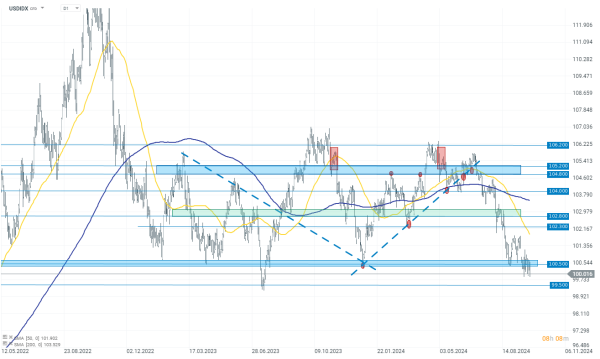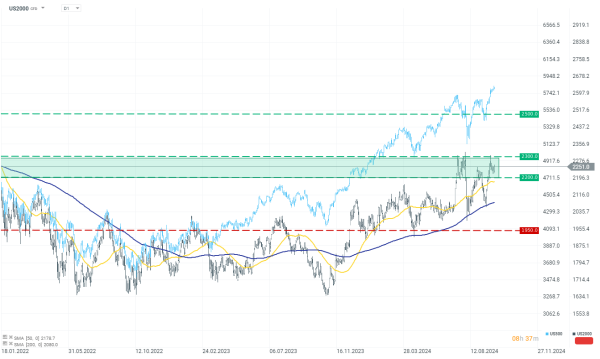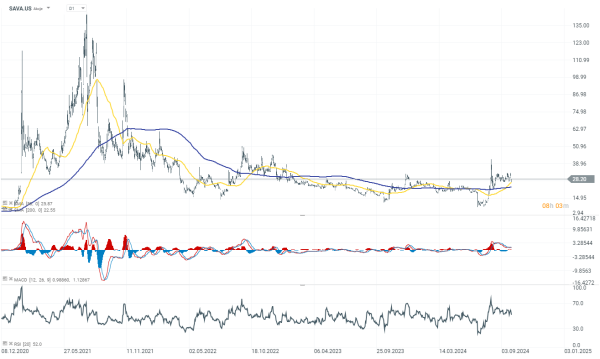US Open: indices gain on falling PCE inflation 🎯
- Small-Cap Companies Gain the Most
- US500 remains above 5800 points
- The dollar is losing significantly, with the USDIDX dropping below 100 points
- Bond yields are falling
Lower PCE data is fueling gains in the stock market, with small-cap companies from the US2000 index leading the rally. Improved sentiment in risky assets is also supported by the weakening dollar, which has been struggling to hold the 100-point level for several days. At the time of publication, the USDIDX index is down 0.40% to 99.9000 points. Bond yields are also experiencing a sharp decline, with 10-year and 2-year yields falling to 3.75% and 3.59%, respectively.
The dollar index is at the lower boundary of a nearly 3-year consolidation channel. A sustained break below the 100-point zone could signal further declines. As a result, a cheaper dollar should continue to support stock and cryptocurrency markets.

Source: xStation 5
Buying demand in the market is supported by lower inflation readings from the 14:30 publication. The PCE inflation measure is favored by the Fed because it considers a broader basket of goods, and the weights of individual products are updated regularly based on need. Consequently, this means that PCE inflation is better able to reflect current inflationary pressures. Lower readings support speculation of a 50 bp cut at the November meeting. At the time of publication, the chances of such a move are 54% compared to 46% for a 25 bp cut.
US2000
The small-cap index is gaining 0.70% today, reaching 2250 points. However, in the longer term, compared to the US500 index, the small-cap index is clearly underperforming. It still needs 9% to reach a new ATH at 2450 points.

Source: xStation 5
Company Highlights
Bristol-Myers Squibb (BMY.US) shares jumped 2.6% after the FDA approved its novel schizophrenia treatment, Cobenfy, developed through its $14B acquisition of Karuna Therapeutics. This drug represents a significant advancement in schizophrenia treatment, targeting cholinergic receptors rather than traditional dopamine receptors.
BlackBerry (BB.US) shares declined over 7.5% despite surpassing FQ2 expectations and raising its FY2025 outlook, as its FQ3 revenue forecast fell short of consensus estimates, projecting $150M at the midpoint, below the $155M expected. The company also slightly adjusted its FY2025 revenue guidance, now expecting $591M to $616M.
Cassava Sciences (SAVA.US) decreases by 13.30% following a settlement with the SEC over "misleading claims" related to an Alzheimer's clinical trial. The company’s founder and former CEO, along with a former executive, will pay over $40M in penalties. Despite this, Cassava maintains its cash reserve outlook for year-end 2024 at $117M to $127M, with net cash use for operations expected to be $80M to $90M in the second half of 2024.
